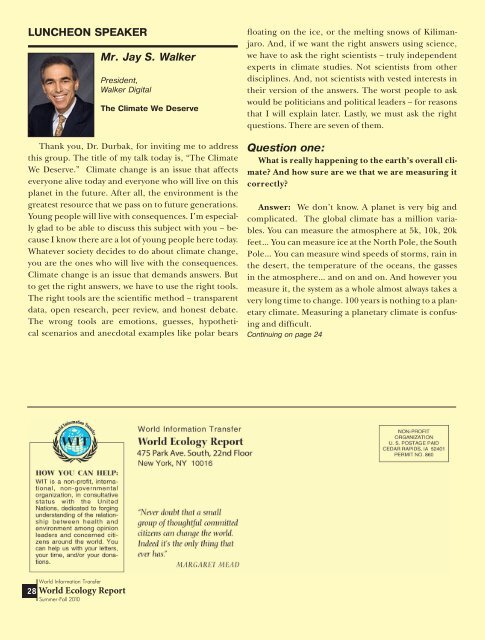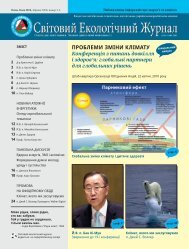V. XXII No 2, 3 - World Information Transfer
V. XXII No 2, 3 - World Information Transfer
V. XXII No 2, 3 - World Information Transfer
You also want an ePaper? Increase the reach of your titles
YUMPU automatically turns print PDFs into web optimized ePapers that Google loves.
LUNCHEON SPEAKERMr. Jay S. WalkerPresident,Walker DigitalThe Climate We DeserveThank you, Dr. Durbak, for inviting me to addressthis group. The title of my talk today is, “The ClimateWe Deserve.” Climate change is an issue that affectseveryone alive today and everyone who will live on thisplanet in the future. After all, the environment is thegreatest resource that we pass on to future generations.Young people will live with consequences. I’m especiallyglad to be able to discuss this subject with you – becauseI know there are a lot of young people here today.Whatever society decides to do about climate change,you are the ones who will live with the consequences.Climate change is an issue that demands answers. Butto get the right answers, we have to use the right tools.The right tools are the scientific method – transparentdata, open research, peer review, and honest debate.The wrong tools are emotions, guesses, hypotheticalscenarios and anecdotal examples like polar bearsfloating on the ice, or the melting snows of Kilimanjaro.And, if we want the right answers using science,we have to ask the right scientists – truly independentexperts in climate studies. <strong>No</strong>t scientists from otherdisciplines. And, not scientists with vested interests intheir version of the answers. The worst people to askwould be politicians and political leaders – for reasonsthat I will explain later. Lastly, we must ask the rightquestions. There are seven of them.Question one:What is really happening to the earth’s overall climate?And how sure are we that we are measuring itcorrectly?Answer: We don’t know. A planet is very big andcomplicated. The global climate has a million variables.You can measure the atmosphere at 5k, 10k, 20kfeet… You can measure ice at the <strong>No</strong>rth Pole, the SouthPole… You can measure wind speeds of storms, rain inthe desert, the temperature of the oceans, the gassesin the atmosphere… and on and on. And however youmeasure it, the system as a whole almost always takes avery long time to change. 100 years is nothing to a planetaryclimate. Measuring a planetary climate is confusingand difficult.Continuing on page 24<strong>World</strong> <strong>Information</strong> <strong>Transfer</strong>28 <strong>World</strong> Ecology ReportSummer-Fall 2010




